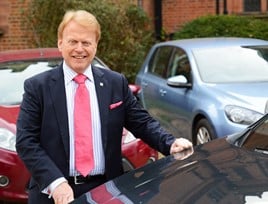UK Prime Minister Boris Johnson has revealed Government’s plan to ban the sale of new purely petrol and diesel-powered cars and vans by 2030 as part of a 10-point “green recovery” plan.
In a letter published by the Financial Times, Johnson said that “lacing the land” with electric vehicle (EV) charge points will also pave the way to realise his plan to go a step further by 2035 – when an outright ban on the sale of new internal combustion engines (ICE) will include hybrid vehicles.
The plan, which many had been expecting in recent days, comes as part of a push towards green energy, which Johnson said would create 250,000 jobs, attract £12bn of Government investment – and three times that from private sources – and see the UK become “the Saudi Arabia” of offshore wind energy.
Laying out the bold plan in his FT editorial, Johnson said: “We’ll invest more than £2.8bn in electric vehicles, lacing the land with charging points and creating long-lasting batteries in UK gigafactories.
“This will allow us to end the sale of new petrol and diesel cars and vans in 2030. However, we will allow the sale of hybrid cars and vans that can drive a significant distance with no carbon coming out of the tailpipe until 2035.”
Johnson added: “There will be electric vehicle technicians in the Midlands, construction and installation workers in the North East and Wales, specialists in advanced fuels in the North West, agroforestry practitioners in Scotland, and grid system installers everywhere. And we will help people train for these new green jobs through our Lifetime Skills Guarantee.”
National Franchised Dealers Association (NFDA) chief executive, Sue Robinson, said that the industry body would “look forward to further details from the Government on how it plans to incentivise consumers and support businesses”.
 Society of Motor Manufacturers and Traders (SMMT) chief executive, Mike Hawes, echoed the sentiments of many in automotive, however, branding the Government’s ambitions as an “an immense challenge”.
Society of Motor Manufacturers and Traders (SMMT) chief executive, Mike Hawes, echoed the sentiments of many in automotive, however, branding the Government’s ambitions as an “an immense challenge”.
Hawes said: “We share government’s ambition for leadership in decarbonising road transport and are committed to the journey.
“Manufacturers have invested billions to deliver vehicles that are already helping thousands of drivers switch to zero, but this new deadline, fast-tracked by a decade, sets an immense challenge.
“Success will depend on reassuring consumers that they can afford these new technologies, that they will deliver their mobility needs and, critically, that they can recharge as easily as they refuel.
“For that, we look to others to step up and match our commitment.
“We will now work with government on the detail of this plan, which must be delivered at pace to achieve a rapid transition that benefits all of society, and safeguards UK automotive manufacturing and jobs.”
 Steve Nash, the chief executive of the Institute of the Motor Industry (IMI) had already expressed his concerns about the need to train thousands of technicians in prepapration for an explosion in EV mobility.
Steve Nash, the chief executive of the Institute of the Motor Industry (IMI) had already expressed his concerns about the need to train thousands of technicians in prepapration for an explosion in EV mobility.
Commenting on the Prime Minister’s announcement, he also questioned what impact it would have on consumer choice. He said: “We knew it was coming, but of course the implications for the automotive industry are monumental; manufacturers now know that they must replace their entire product offering with electrified vehicles in less than 10 years.
“That can surely only mean that their ranges will shrink significantly compared to today. Let’s hope that consumer choice remains front and centre.
“Whilst the devil is certainly going to be in the detail, and the IMI welcomes the opportunity to engage with government to provide input for its plans, we are concerned that, as usual, it seems little thought has been given to the swathe of businesses and individuals employed by the automotive industry beyond manufacturing.
“Yet it is this ecosystem – from the distribution chain of car dealers to service and repair and even accident recovery – that fundamentally underpins the government’s ambitions.
“If the new parc of electric vehicles can’t be serviced and repaired safely the whole plan will stall on the starting grid.”
IMI data suggests that just 5% of UK automotive technicians are “adequately” trained to work on EVs. Nash said: “We are currently a long way off achieving a critical mass of technicians qualified, with COVID-19 setting us back significantly in reaching optimum numbers in time for 2035, let alone 2030.
“Government action is needed urgently to encourage automotive employers to re-ignite their EV training plans.”
The UK Government’s 10-point “green recovery” plan, as spelled out by the Prime Minister, vows to:
- Make the UK the Saudi Arabia of wind with enough offshore capacity to power every home by 2030.
- Turn water into energy with up to £500m of investment in hydrogen.
- Take forward our plans for new nuclear power, from large scale to small and advanced modular reactors.
- Invest more than £2.8bn in EVs to facilitate the 2030 ban the sale of new petrol and diesel cars, allowing the sale of hybrid cars and vans that can drive “a significant distance with no carbon coming out of the tailpipe” until 2035.
- Have cleaner public transport, including thousands of green buses and hundreds of miles of new cycle lanes.
- Strive to repeat the feat of Jack Alcock and Teddie Brown, who achieved the first nonstop transatlantic flight a century ago, with a zero-emission plane. And we will do the same with ships.
- Invest £1bn next year to make homes, schools and hospitals greener, and energy bills lower.
- Establish a new world-leading industry in carbon capture and storage, backed by £1bn of government investment for clusters across the North, Wales and Scotland.
- Harness nature’s ability to absorb carbon by planting 30,000 hectares of trees a year by 2025 and rewilding 30,000 football pitches’ worth of countryside.
- Deliver a £1bn energy innovation fund to help commercialise new low-carbon technologies, like the world’s first liquid air battery being developed in Trafford.
Johnson said that he would meet UK businesses to discuss their contribution today (November 18), adding that he planned to “provide clear timetables for the clean energy we will procure, details of the regulations we will change, and the carbon prices that we will put on emissions”.
A “task force net zero” committed to reaching net zero by 2050 will also be formed and, through next year’s COP26 summit, countries and companies around the world will be urged to join the UK in delivering net zero globally.
EV demand
The Society of Motor Manufacturers and Traders (SMMT) new car registrations data for October showed that overall EV market share was 12.1%, up from just 4.4% year-on-year.
While consumer research and consumer trends data from Auto Trader shows that motorists consideration of EVs is at its highest ever level, meanwhile, director Ian Plummer believes there is still a way to go to meet the government’s new target.
Auto Trader consumer research conducted in August revealed that 77% of car buyers are currently considering buying an EV, with 91% are concerned about the impact of cars on the environment.
It found that 53% are considering an EV because of cost savings associated with running costs, while 48% said it was to reduce pollution.
 But Plummer said: “In order to meet the government’s new ban of petrol and diesel cars by 2030, the sale of EVs must overtake the sale of traditional ICE cars by 2024. But, on the current sales trajectory this won’t happen until 2029.
But Plummer said: “In order to meet the government’s new ban of petrol and diesel cars by 2030, the sale of EVs must overtake the sale of traditional ICE cars by 2024. But, on the current sales trajectory this won’t happen until 2029.
“It’s clear that electric vehicles need to be the preferred option to the masses and not just to those who are environmentalists, early adopters or the wealthy that can afford their high price tags, but that isn’t the case yet.
“Over the last six months, while supply levels of EVs have increased with the launch of several new models, consumer demand hasn’t increased at the same pace. In a world of so much unrest, consumers have stuck to what they know – particularly petrol cars.”
Plummer said that Brexitmay also hamper Government’s EV plans.
“Without a EU trade deal in place, the UK won’t be considered a viable market for manufacturers to send new EV stock to,” he said.
“Now is the time for all industry stakeholders to come together so that we can make meaningful change in the adoption of EVs, otherwise the government’s ambitious target remains far out of reach.”
